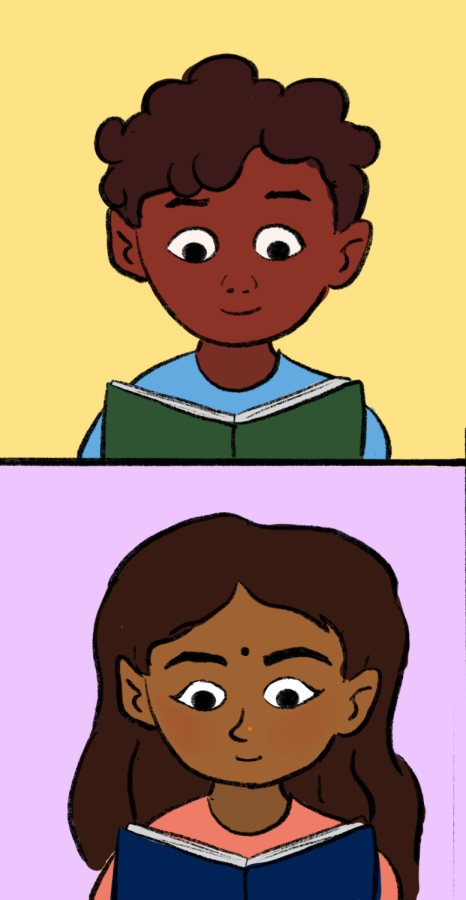Q&A: Sailaja Joshi, founder of Mango & Marigold Press, discusses South Asian representation in childrens’ books
May 4, 2023
When looking for books to buy for her young daughter, Northeastern alum Sailaja Joshi noticed the lack of children’s books that represented South Asian culture.
“At the time, there were five times as many books about dogs and trucks than there were about every single child of color,” Joshi said. “That includes [Asian American and Pacific Islander] communities, Black communities, Latino communities, all of them.”
As a result, Joshi founded the Mango & Marigold Press, an award-winning publishing company that provides a platform for children’s authors publishing books representing South Asian culture. Now, almost eight years after its founding, Joshi reflects on how far her business has come, as well as what she hopes for the future.
The following interview has been edited for length and clarity.
HN: Can you tell me a little bit about the vision you had for this company and how you were able to achieve that with your co-founders?
Sailaja Joshi: The vision was to share the diverse stories of the South Asian experience and of India. I say South Asian experience, and my authors and illustrators would often be like, “God, that’s so broad.” And I was like, “Yeah, it absolutely is,” but that’s because I wanted it to be. I worked really closely with my sister, SriVani Ganti, who is also a Northeastern graduate. She was really someone who thought of the intersectional experience of the South Asian experience. Megan Boshuyzen is a close family friend of ours, and she came to us with a visionary branding — an idea of how we implement this. She often worked to create our website, to create social media content to help shape what our conversations would look like, and then later on moved into a more strategic content development role, especially when it came to our email campaigns, which is a lot of what she does professionally.
HN: What was your experience in the publishing field before this? Were you a writer or is this just something that you noticed and wanted to jump onto?
Sailaja Joshi: I came through this through my own experience of motherhood. The story goes that I was pregnant with my first born, who’s now almost nine years old. My husband’s aunt threw us this library themed baby shower, and she was like, “Oh, why don’t you put books in it because I want people to give you books as a gift instead of a card.” And it was a great idea. I was going through Amazon and I was trying to find books that reflected my culture. There was stuff out there, but it was developmentally inappropriate, culturally inaccurate or culturally insensitive at times. And I was like, “How does a country that has a billion plus people have such poor representation in children’s books?” I did some digging and started to understand the landscape, and I decided I want to take a stab at this. At the time, I was in my doctoral program at Northeastern, and I had a 7 month-old. I took $1,000 of startup capital from the Northeastern Idea Fund and hired my first illustrator, Tim Palin. And that’s how I started my press.
HN: How did you reach out to authors that write this kind of stuff? Did you market yourself in a way that made them come to you with these children’s books?
Sailaja Joshi: They pretty much immediately came to me. I think that what I was doing really resonated with them. For that reason, we are very blessed that we found incredibly talented authors who understood our vision. We work incredibly closely with our authors in shaping their text and thinking about the illustrations. We just are very lucky that our authors come to us.
HN: In the future, what are some challenges you may have to adapt to to stay successful in this market?
Sailaja Joshi: Most of it is not something I personally have an ability to control or have a say in. Amazon is a Goliath. Amazon has created this illusion that if you pay $200 a year, you can have free shipping. They’re able to physically beat those costs. Consumer expectation has been shifted, small presses don’t have the same economic means as larger companies. Our way of working right now is thinking very critically about how we might make our path forward. Like, how do we nurture the titles that continue to exist with us and how do we find new homes for our other authors? And then what does the next step look like for us? There was a sort of shift in the economics of even printing a book during the pandemic. The cost to print my book actually went up 30%, just the raw costs and how much paper cost. And then the cost of the book itself can’t really go up because of the expectation that consumer giants, like Amazon, have set.
HN: Has your press ever done collaborations with schools in Boston or with libraries in the area?
Sailaja Joshi: We have a really strong nonprofit called 1001 Diverse Books that does a lot of the bridging of the accessibility gaps. Schools are fairly underfunded holistically throughout the United States. For the most part, their ability to purchase a book is ideally through their library system. We’re in a ton of libraries. We’ve done a lot of programming in Boston. Most recently we were actually in New York doing a bunch of work with their inner-city school system and bringing authors there to read some of our books.
HN: How do you try to spread awareness of your business through social media?
Sailaja Joshi: We’ve done a lot of work to advocate for ourselves as a small business owner and as a minority-owned business. We’re just in a really tricky space where there is such a set price of how much a book should cost. Consumers can just go to Amazon and get a book cheaper is a lot of people’s mentality. I think early in the COVID-19 era, we did find a lot of folks supporting us, trying to find ways to support us, which was great. And that mostly comes from social media sharing, which is actually incredibly valuable. Then as we’ve gone through and as folks’ pockets have become a little less aligned, I think we’ve seen less of that. And small business Saturdays now are really great ways for folks to have physical spaces and to call attention to them and get a bump in their business. But for us, it’s sort of a little bit of a leap, like it doesn’t necessarily work out.
HN: What about your journey creating this press are you the most proud of?
Sailaja Joshi: We were the first South Asian entrepreneurial brand to really showcase our cultural identity. And I’m incredibly proud of that. I’m incredibly proud of the stand we took during public controversy, like the George Floyd murder, in supporting communities of color. We were in an active conversation of how South Asian identity is complicit in white supremacist narratives. We did that very vocally and very specifically, and some of that came to our detriment of lost customers and sales. And I’ve never been prouder because I deeply believe in standing up for what is right and what is just and that’s not always the easy path.







